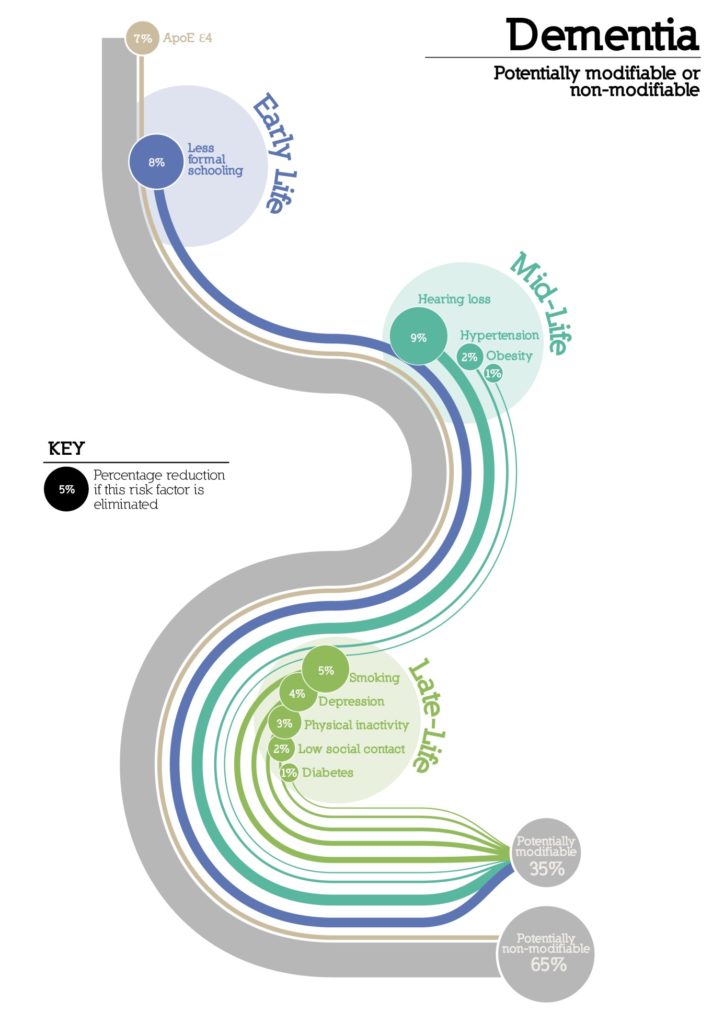Dementia – Potentially modifiable or not?

ENRICHEnabling Research in Care Homes
GUEST BLOG
Dementia – Potentially modifiable or not?
Professor Gill Livingston, University College London
As a doctor researcher within UCL psychiatry, I am concerned with what works to help people with dementia and their families and to generate and help implement research which makes a difference to future dementia challenges.

As a doctor researcher within UCL psychiatry, I am concerned with what works to help people with dementia and their families and to generate and help implement research which makes a difference to future dementia challenges. So I was delighted to be asked by The Lancet, an internationally prominent medical journal, to lead a commission and to be able to choose commissioners who were experts in the field. Our recommendations should be used for the benefit of people with dementia and their relatives.

The Lancet initiative was because they thought that the evidence about what to do in dementia was an important and neglected area. Currently, nearly 50 million people live with dementia worldwide, with this figure projected to increase to 132 million by 2050. Dementia occurs mainly in the over 65s and the increase in numbers is therefore largely driven by increased longevity resulting from the welcome reduction in premature mortality. The cost of caring for people with dementia is over US$800 billion per year globally, and expected to rise to US$2 trillion by 2030
I chose leading researchers from the literature on dementia and recommendations from those whom I initially asked. I wanted people from different disciplines and different countries. Everybody I asked thought it was a good idea, and wanted to participate. We had members from psychiatry, neurology, geriatric medicine, gerontology, epidemiology, public health, psychology and statistics.
Overall there were 24 experts from a wide range of disciplines, assessing the evidence, undertaking new research, and generating evidence-based recommendations. The Lancet Commission on Dementia Prevention, Intervention and Care, which is the full name presented its recommendations on July 20 this year at Alzheimer’s Association International Conference (AAIC).
We intend that the recommendations from the commission should influence individual clinicians, policy makers and public health. The goal is to achieve effective and fair dementia care, prevent dementia and reduce the symptoms of people with dementia and help their families cope.
We have covered many topics including: prevention of dementia, mild cognitive impairment, timely diagnosis and how to make it, protecting people with dementia, planning for the future, interventions for cognition, psychosis, agitation, depression, sleep disorders and other symptoms; caring for the family carer, abuse, decision making and end of life care, as well as care delivery.
In prevention of dementia we produced the first life course model of dementia prevention (see below). We should be ambitious about the prevention of dementia as its prevalence would be halved if its onset was delayed by 5 years.
It’s never too late or too early to start preventing dementia. We outline nine lifestyle factors responsible for over a third of dementias. The numbers are the potential percentage of dementia that could be prevented or delayed if a specific risk factor was completely removed.
You can find the Commission’s report here, http://www.thelancet.com/commissions/dementia2017
Gill Livingston is a Professor of Psychiatry of Older People within the Division of Psychiatry and Faculty of Brain Sciences at University College London.
You can follow Professor Livingston on twitter at https://twitter.com/Gill_Livingston you can also find more information on the MARQUE Study at http://www.ucl.ac.uk/psychiatry/marque/about-the-project